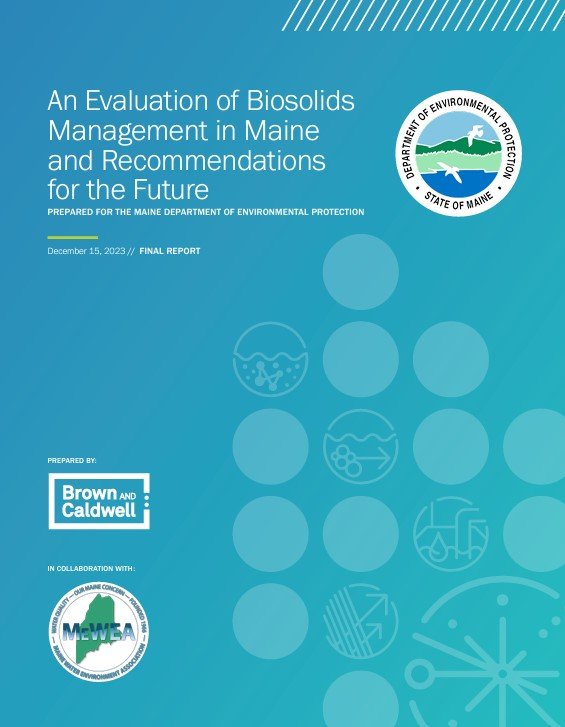Back in mid-December, the Maine Department of Environmental Protection (MEDEP) published the results of a study done by Brown and Caldwell consultants in collaboration with the Maine Water Environment Association (MEWEA). Entitled “An Evaluation of Biosolids Management in Maine and Recommendations for the Future,” the report reviews the series of public policy decisions in Maine that have left water resource recovery facilities (WRRFs) there with only one option for managing their biosolids: disposal in landfill.
Maine’s decisions led to a dire situation back in early Spring 2023, when the State’s main landfill that was taking the majority of the biosolids – Juniper Ridge Landfill (JRL) – ran into some major structural and safety issues as a result of all the wet wastes being disposed there. The landfill operator, Casella, had to temporarily interrupt service to its WRRF customers while Casella excavated and repacked the problem area of the landfill. Casella worked with MEDEP to obtain a temporary emergency authorization to use its Hawk Ridge composting facility to more efficiently receive and transfer the solids, most of which went out of state and to Canada. The solids piled up, threatening permit compliance and water quality. MEWEA did not have to push MEDEP too hard to initiate a comprehensive study and a plan for managing biosolids into the future.
Not surprisingly, the main take away from the report is that landfilling biosolids is not a sustainable solution. The report’s authors had a dire warning for Maine: “As soon as 5 years from now, there could be a drastic shortfall in capacity. . . “unless the State takes actions.” The report recommended a number actions ranging from short-term to long-term solutions. There were a surprising number of short-term recommendations, mainly related to the expansion of landfill disposal capacity, including:
Allow the expansion the Juniper Ridge landfill;
Seek other landfills in the state with capacity for biosolids;
Fund a study on bulking agents available to facilitate biosolids disposal in landfill;
Fund pilot studies of PFAS removal and destruction technologies.
Recommended solutions requiring a little more lead time included projects to reduce sludge volumes -- like sludge dryers -- and looking at regional infrastructure. It mentions that funding from the State will be required. The report suggested reevaluating the ban on land application of biosolids, perhaps revisiting the screening standards previously put in place by the MEDEP. The major long-term recommendation was to fund full-scale PFAS removal/treatment systems for Maine’s biosolids.
Although some of the consequences from Maine’s ban on recycling biosolids in-state were anticipated – or at least foretold by the managers of those materials – some remain to be examined, such as the long-distance trucking costs and increased impacts on the climate.
The primary author of the report, Bill Brower, P.E., told NEBRAMail “BC really appreciated the opportunity to work collaboratively with Maine DEP, representatives from MeWEA, contractors and technology vendors to take a close look at the fundamental issues facing biosolids management in Maine, and develop concrete steps that Maine government and the legislature can take to address challenges.”
The collaborative study by the MEDEP is the first step to developing a long-term plan for sustainably managing Maine’s wastewater sludges. Now biosolids management is part of the MEDEP’s Materials Management Plan. The MEDEP’s January 2024 report to the legislature specifically references the December biosolids study in its 2024 State Waste Management and Recycling Plan Update and 2022 Waste Generation and Disposal Capacity Report. The report was submitted to the Joint Standing Committee on Environment and Natural Resources (2024-MMMP FINAL.pdf).
This in-depth study of biosolids is exactly what every state should be working on. The Massachusetts Department of Environmental Protection (MassDEP) is undertaking a similar study that it hopes to complete in short order. On December 8, 2023, the MassDEP published a Request for Quotes for "PFAS and Residuals Technology and Management Study, Part 1". The work has been awarded to the team of Tighe & Bond and Brown & Caldwell. MassDEP wants Part 1 done by June 30th. The estimated cost for Part 1 -- $250,000 -- is being paid with funds from MassDEP's Capital Investment Plan.



